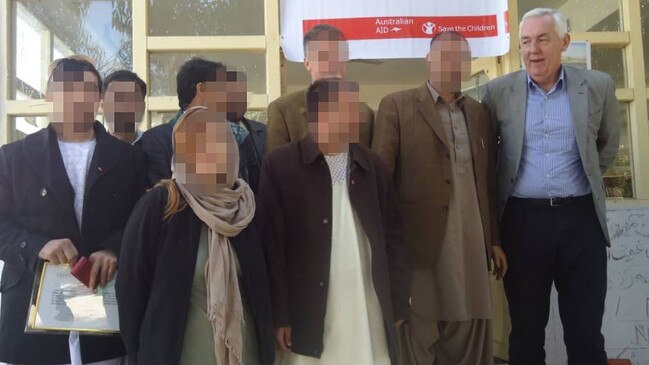Afghanistan angels left for dead as Taliban closes in
Afghans linked to Australian-funded ‘hearts and minds’ projects exposed to advancing Taliban forces after being denied visa access.

Hundreds of Afghans linked to Australian-funded “hearts and minds” projects will be left vulnerable to advancing Taliban forces after being denied access to a special visa program for those who supported Australia’s two-decade presence in the country.
Correspondence sent on behalf of Foreign Minister Marise Payne to one Afghan aid worker who helped deliver a $6.7m AusAID infrastructure project makes it clear he would not be considered for the Locally Engaged Employee Visa.
The former Central Asia Development Group employee is among about 50 Afghan aid workers heavily involved in Australian-led projects, including the flagship Children of Uruzgan program delivered by Save the Children.
The local workers and their family members, together with 100 contracted security guards and their families, will be forced to join the offshore asylum-seeker queue with millions of other Afghans seeking to flee the country. An estimated 200 Afghan interpreters directly employed by the Australian government are also still in the country awaiting immigration rulings.
The Department of Foreign Affairs ruling comes as the Taliban continues to gain territory across the country after the US, Britain and Australia pulled out their remaining forces, leaving the crumbling Afghan National Army to battle the insurgency alone.
In Uruzgan, the Taliban now holds five of six districts, with only Tarin Kowt, the province’s capital, not in the hands of the insurgents.

The aid worker, who spoke on condition of anonymity, citing security risks if his identity was revealed, was told on June 21 that he could not apply for the special Australian visa because he had been engaged through a subcontractor.
“The Australian Minister for Foreign Affairs and Trade has considered your application,” the letter, obtained by The Australian, reads. “Unfortunately, you are not eligible for certification under this visa policy as you were not considered an employee of one of the Australian government agencies identified in the legislative instrument.”
The man, who is now in hiding with his wife and five children, said his work on the Uruzgan Municipal Infrastructure Program from 2011 to 2015 had made him a Taliban target.
“I put my life at risk. It’s not just me, it is a risk for my family. If you were in my shoes what would you do? If I will die, the responsibility will be on the shoulders of the Foreign Minister,” he said in a recording from Afghanistan.
“I did honest work for (for Australia), I tried my best, and I always tried to spend the funds provided by the Australian government honestly, I did not give it to the mafia, or share the funds … with the Taliban or terrorist groups.
“They asked me several times and I said no.”
Retired Army Major Stuart McCarthy said the rejection letter was an effective “death warrant”, with 15 of the man’s former colleagues already feared murdered.
“These people delivered projects that were vital to our counter-insurgency campaign at the height of Australia’s involvement in the war in Afghanistan, and yet we are leaving them to be slaughtered,” Major McCarthy said.
He said the failure to evacuate Afghans who had helped Australia could have long-term national security implications.
“What we are saying to the world is if you work for Australia in a conflict zone, you could be left behind when the going gets tough,” Mr McCarthy said.
Australian National University academic William Maley, who has spent decades researching Afghanistan, said the government had taken “a highly legalistic approach” in determining who could apply for LEE visas.
“The Taliban doesn’t care if a person was an employee or a subcontractor. It’s a meaningless distinction from their point of view,” he said. Professor Maley said there were also many recipients of Australian scholarships, which were heavily promoted by Australia through social media, who were now in danger.
“There is a much wider circle of people who are vulnerable by virtue of their connection to Australia,” he said.

Afghans who worked for the Department of Foreign Affairs and Trade must first seek approval from the department before applying for an LEE visa, while those who worked for the Australian Defence Force must initially apply through Defence.
The categories of eligible applicants date back to 2012, with the current government opting not to open up the program to contracted workers. A Department of Foreign Affairs and Trade spokeswoman said: “Locally engaged staff who worked for us, and who have a legitimate case for a visa are being provided with an opportunity to come to Australia.
“The Australian government is working to ensure each case is considered swiftly and those at risk of harm who meet visa requirements are resettled to Australia as soon as possible. For privacy reasons, we do not comment on individual cases.”
The Department of Home Affairs said it was “urgently processing” Afghan LEE visa applications.
It said more than 230 Afghans had been granted the visas since April 15, including employees’ family members. Other nations are also struggling to evacuate their own locally-engaged employees, amid growing chaos within the country.
In recent days, the US abandoned Bagram Airfield – the centre of its operations over two decades – in a clear indication its withdrawal from the country was all but complete. The last of Australia’s soldiers are also believed to have left the country, but Defence refused to confirm or deny whether any remained.







To join the conversation, please log in. Don't have an account? Register
Join the conversation, you are commenting as Logout